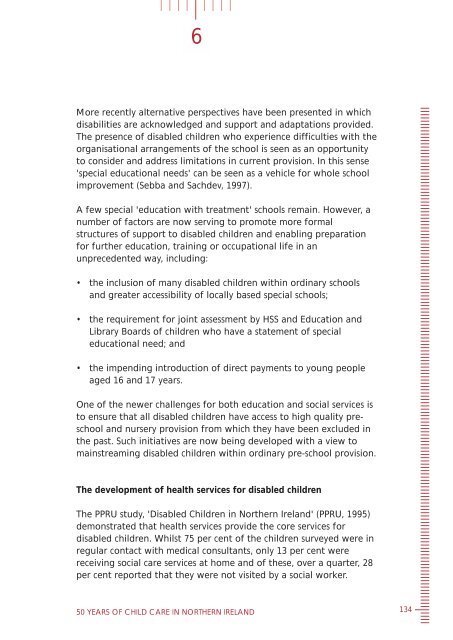childcare-50years
childcare-50years
childcare-50years
Create successful ePaper yourself
Turn your PDF publications into a flip-book with our unique Google optimized e-Paper software.
6<br />
More recently alternative perspectives have been presented in which<br />
disabilities are acknowledged and support and adaptations provided.<br />
The presence of disabled children who experience difficulties with the<br />
organisational arrangements of the school is seen as an opportunity<br />
to consider and address limitations in current provision. In this sense<br />
'special educational needs' can be seen as a vehicle for whole school<br />
improvement (Sebba and Sachdev, 1997).<br />
A few special 'education with treatment' schools remain. However, a<br />
number of factors are now serving to promote more formal<br />
structures of support to disabled children and enabling preparation<br />
for further education, training or occupational life in an<br />
unprecedented way, including:<br />
• the inclusion of many disabled children within ordinary schools<br />
and greater accessibility of locally based special schools;<br />
• the requirement for joint assessment by HSS and Education and<br />
Library Boards of children who have a statement of special<br />
educational need; and<br />
• the impending introduction of direct payments to young people<br />
aged 16 and 17 years.<br />
One of the newer challenges for both education and social services is<br />
to ensure that all disabled children have access to high quality preschool<br />
and nursery provision from which they have been excluded in<br />
the past. Such initiatives are now being developed with a view to<br />
mainstreaming disabled children within ordinary pre-school provision.<br />
The development of health services for disabled children<br />
The PPRU study, 'Disabled Children in Northern Ireland' (PPRU, 1995)<br />
demonstrated that health services provide the core services for<br />
disabled children. Whilst 75 per cent of the children surveyed were in<br />
regular contact with medical consultants, only 13 per cent were<br />
receiving social care services at home and of these, over a quarter, 28<br />
per cent reported that they were not visited by a social worker.<br />
50 YEARS OF CHILD CARE IN NORTHERN IRELAND<br />
134


